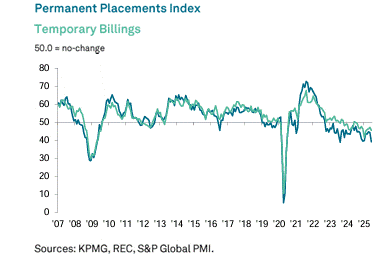UK BoE Hints of Faster Easing Backed up by Survey Data?
Somewhat ironically, just as BoE Governor Bailey suggested that signs of increasing labor market slack might prompt faster rate cuts, more such evidence accumulates. In fact, as monthly survey compiled by Markit pointed to not only weaker pay pressures, falling job rolls (Figure 1) and a steep rise in those looking for work, the latter very much associated with increased slack. Even with resilience CPI data due later this week, this very much points not only to a further rate cut at the looming Aug 7 MPC meeting but the extent that the updated Monetary Policy Report to be released alongside suggests faster conventional easing ahead and maybe also toned down unconventional tightening.
Figure 1: Weaker Labor Market Signs Accumulate

Bailey used an interview to underscore the repeated BoE view that the path is downward for interest rates. But he said the MPC continues to use the words ‘gradual and careful’ because – as some people say - why are you cutting when inflation’s above target? However, If the MPC saw the slack opening up much more quickly, that would lead us to a different conclusion, albeit possibly with splits among committee members.” He suggested that the Chancellor’s decision to hike taxes on employers is probably making firms adjust employment and hours and also having pay rises that are possibly less than they would have been if the NICs change hadn’t happened. This may be the case but we would note that labor market weakness may be emerging in the EZ too at present.
But Baileys' thinking chimes with UK survey data. Indeed, a monthly labor market snapshot from the Recruitment and Employment Confederation (REC) and the accountancy firm KPMG showed the number of new candidates looking for work rose at the sharpest rate since November 2020, when the UK entered the second nationwide lockdown. It pointed to increased redundancies and weaker labor demand, both indicative of added labor supply and thus added labor market slack. The survey also explicitly blamed the “scar tissue” left by tax rises introduced in April by the government, including a £25bn increase in employer national insurance contributions (NICs). The survey also found that permanent placements had dropped at the fastest pace in 22 months (Figure 1), alongside weaker levels of pay growth and reports of redundancies and reduced appetite for staff.